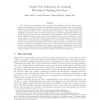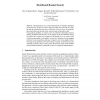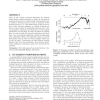266 search results - page 20 / 54 » Parallel learning to rank for information retrieval |
SIGIR
2011
ACM
12 years 10 months ago
2011
ACM
Test collections are the primary drivers of progress in information retrieval. They provide a yardstick for assessing the effectiveness of ranking functions in an automatic, rapi...
SIGIR
2011
ACM
12 years 10 months ago
2011
ACM
We study how to best use crowdsourced relevance judgments learning to rank [1, 7]. We integrate two lines of prior work: unreliable crowd-based binary annotation for binary classi...
HIPC
2007
Springer
14 years 1 months ago
2007
Springer
P2P deployments are a natural infrastructure for building distributed search networks. Proposed systems support locating and retrieving all results, but lack the information necess...
SODA
2007
ACM
13 years 9 months ago
2007
ACM
We study the problem of aggregating partial rankings. This problem is motivated by applications such as meta-searching and information retrieval, search engine spam fighting, e-c...
CIKM
2008
Springer
13 years 9 months ago
2008
Springer
Many of the recently proposed algorithms for learning feature-based ranking functions are based on the pairwise preference framework, in which instead of taking documents in isola...



